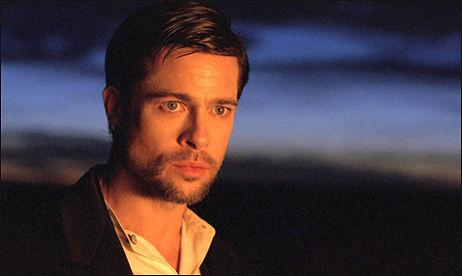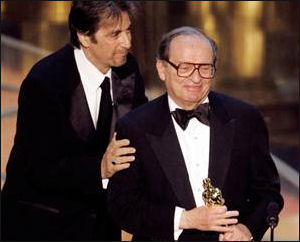I’m trying to think of a more shallow and contemptible attitude toward the Iraq War movies than “they don’t ring my bell — I’d prefer something more entertaining.” The Iraq War is our national (and international) tragedy, and about half of this country voted for a man they knew had fabricated reasons for invading in the first place, which means those people bear major responsibility. And here we are living our insular, complacent, doped-up lives in this plastic shopping-mall nation of ours, and we can’t be bothered to absorb, much less consider, movies about what’s going on in Iraq because it’s not entertaining enough? Dylan said it best in Tombstone Blues: “Tell me great hero, but please make it brief/Is there a hole for me to get sick in?”
Day: September 17, 2007
A good “goddam”
Sally Field was bleeped at the Emmys for saying “goddam,” but the entire statement — “And let’s face it — if the mothers ruled the world, there wouldn’t be any goddam wars in the first place!” — is straight, plain, dead-on. What blue-nose biddy would bridle at that adjective in that context?
“Zodiac” demo reel
This demo reel of CG effects that went into Zodiac makes me respect David Fincher‘s film even more.
2 more downbeat Iraq-Afghanistan articles
I failed to link last Friday to a pair of downbeat articles about the Iraq-Afghanistan films — a 9.14 Wall Street Journal piece by Peter Sanders, and another by Variety‘s chief critic Todd McCarthy.
“No matter the specific qualities of the writing, filmmaking and performances,” writes McCarthy. “The problem for me is that all these films emanate from precisely the same mindset, the safest, least provocative attitude it is possible to have: the war sucks, Bush sucks, America is down the tubes.”
“Critics say Hollywood, with its distinct liberal bias, lacks credibility when it comes to making political films,” Sanders observes. “Some executives say they wonder if moviegoers confronted with grim realities on the nightly news will want to see fictionalized versions of them as entertainment. ‘I am concerned about viewer fatigue,’ says Chris Carlisle, president of domestic theatrical marketing at New Line Cinema, which is releasing Rendition on 10.19. ‘A lot of people don’t want to hear another thing about what’s wrong with the government.'”
Haneke’s “Funny Games” trailer
The trailer for Michael Haneke‘s Funny Games (Warner Independent, 2.15.08), which screened on the WB lot a few weeks back but a hiatus is currently in effect. (A journalist friend saw and liked it.) Michael Haeneke has remade his 1997 German-language original with an English-language cast — Naomi Watts, Michael Pitt, Tim Roth, Brady Corbet, Siobhan Fallon. It’s a family-hostage melodrama that recalls that horrific incident that happened in Cheshire, Connecticut, last July.
Support “Jesse James”!
The Assassination of Jesse James by the Coward Robert Ford (Warner Bros., 9.21 limited) is only opening in four cities this Friday (New York, LA, Toronto Austin) and, let’s face it, is too much of swoony tour de force art film to connect with mainstream audiences.

But it’s important, I feel (as do those who’ve praised the film — it’s got a 90% Rotten Tomatoes rating so far), for the per-screen averages to be as high as possible. If you believe in fairies and if you appreciate the importance of giving this awesome film a decent reception, you’ll clap your hands and arm-twist as many friends as you can between now and Friday into seeing it this weekend.
I got nervous last night, you see, as I spoke to a smart couple at a backyard barbecue who’d recently seen and enjoyed 3:10 to Yuma but hadn’t even heard about Jesse James.
Anderson’s ATT spots
This, for me, is the very best of the five Wes Anderson ATT tube spots. Like Anderson’s popular American Express commercial from a couple of years ago, they’re all about a keyed-up character/pitchperson moving from one set to another without cuts. The idea is that nobody works in any one place anymore. In a sense, we all work in “Hollyarkizonasouthamaryland.”
Self-amputations & surgeries
A day or two ago New York magazine film critic David Edelstein became the latest big-name cineaste to launch a blog. He’s calling it “The Projectionist.” Today’s riff, in honor of Peter Fonda‘s endurance of bullet excavating in 3:10 to Yuma and Javier Bardem‘s oozy leg-surgery work in No Country for Old Men, asks readers to name their favorite scene in which a wounded character self-performs or receives some kind of crude medical procedure.
My favorite is Walter Slezak slicing off half of William Bendix‘s leg with a jackknife in Alfred Hitchcock‘s Lifeboat. Bendix doesn’t scream (he’s passed out from having chugged a half-bottle of brandy) but fellow lifeboat passengers Tallulah Bankhead and Hume Cronyn (or am I thinking of Henry Hull?) can’t look at what’s happening after 15 or 20 seconds’ worth. And then someone tosses Bendix’s left boot (i.e., the one he won’t need any more) and it goes thoomp on the hull of the boat.
The Lumet metaphor
Every so often the buyers (i.e., distribution reps) totally miss out on a film’s importance and marketability, and this was certainly the case with Toronto buyers and Sidney Lumet‘s Before the Devil Knows You’re Dead. It’s even the case right now among certain journalists who don’t seem to fully understand that this modern-day Greek tragedy/family-crime film — unquestionably among the top flicks of ’07 — is well positioned to score with critics groups and Academy members between early December and mid January ’08.

Sidney Lumet receiving Lifetime Achievement “gold watch” Oscar from Al Pacino at Academy Award telecast on 2.27.05 —
The selling point with the latter group won’t just be the film (which, in a perfect world, would be enough in itself), but the metaphor of a spunky 83 year-old director whacking a fastball into the left field bleachers. Most directors of Lumet’s age are happy to be in good health and be invited to take part in an occasional film festival tribute. Lumet having produced the best film of his career since Prince of the City can be read (if you’re so inclined) as a blow against ageism in every sector of the industry. Older Academy members are going to feel at least somewhat roused by this, and consider Before The Devil Knows You’re Dead accordingly.
I believe that BTDKYD is an easy candidate for Best Picture, Best Director, Best Supporting Actor (Phillip Seymour Hoffman, Albert Finney, Ethan Hawke…are any of these guys leads?…possibly Hoffman…I can’t decide) and Best Supporting Actress (Marisa Tomei).
Carr on Iraq-Afghanistan films
In his first fall ’07 piece about awards-season Hollywood fare, N.Y. Times media columnist David Carr wonders if all the Iraq-Afghanistan war films opening over the next few months — In The Valley of Elah, Grace Is Gone, Stop Loss, Nothing Is Private, Lions for Lambs, Charlie Wilson’s War and Redacted — are going to meet with any box-office success.

Carr seems at least half persuaded that they may not. The tide of anti-war feeling across the U.S. “is bringing a wave of films about a war that most Americans wish would go away,” he writes.
“Historically, audiences enter the theater in pursuit of counter-programming as an antidote to reality,” he notes. “They’d generally prefer to see Meryl Streep inhabiting Anna Wintour in The Devil Wears Prada rather than playing a seasoned reporter who covers a country that seems to be in the midst of melting down, as she does in Lions for Lambs.”
Why? Because millions of people out there are walking expressions of doped-up lifestyles (i.e., addicted to alcohol, cell phones, general affluence, fatty foods, TV, Tivos, iPods, iPhones, SUVs, various medications, cigarettes and what-have-you …anything that will filter out reality) and states of total political denial.
“And these films have to compete not only with one another, but also with the drumbeat of the news media’s daily coverage of the Iraq war. Another I.E.D., another four Americans dead. Now, who wants popcorn with that?”
One HE dispute: Carr writes that the above films “all take as their central concern the price of America’s military and security activities since the attacks of Sept. 11.” But that’s not true as far as one of these films are concerned, and it’s a stretch with another.
Nothing is Private is a period piece (set in a Houston suburb in ’90 and early ’91, around the time of the Gulf War) that obviously reflects upon American attitudes about Middle Eastern natives now and before, but it’s flat-out wrong to say that its “central concern” is U.S. military and security activities since the World Trade Center attacks. Charlie Wilson’s War also sends out strong echoes about the 9.11disaster (particularly at the very end), but it’s an early ’80s period dramedy about the covert arming of the Afghanistan Muhjadeen in their fight against Russian invaders.
Fergusion disputes
In an N.Y. Times Op-Ed video, No End in Sight director Charles Ferguson rebuts claims made by former chief of Iraq occupation forces L. Paul Bremer III in a 9.6.07 op-ed piece called “How I Didn’t Dismantle Iraq’s Army,” claiming that top “American officials approved the decision to disband the Iraqi army” and not he alone.
